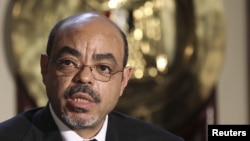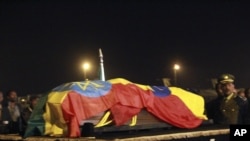Ethiopian Prime Minister Meles Zenawi has died at the age of 57, after months of speculation about his health.
State television announced his death Tuesday, saying he died from a sudden infection late Monday at a hospital abroad.
Speaking with VOA Somali Service, government spokesman Bereket Simon would not say where Meles died, or disclose the illness that led to his hospitalization.
"The prime minister had been sick for quite a while," he said. "And he was attending medical support in, somewhere in, ah, abroad. And he had some chance in recuperating. But ultimately some infection happened to him and doctors couldn't control that infection."
Meles had not been seen in public for nearly two months before his death.
Spokesman Bereket said Deputy Prime Minister Hailemariam Desalegn will serve as acting prime minister.
He said Meles' body will arrive Tuesday in Ethiopia, and officials are making plans for the funeral.
Meles Zenawi
Prime Minister Meles ruled his country for more than 20 years, after the rebel alliance he led, the EPRDF (Ethiopian People's Revolutionary Democratic Front), seized power in 1991.
Meles earned praise abroad for improvements in the economy, education and health care. But human rights groups sharply criticized him for various abuses, including restrictions on independent media.
Under Meles, Ethiopia fought a border war with Eritrea and sent troops to Somalia to fight Islamist militants.
Ethiopia and Eritrea fought from 1998 to 2000 in a conflict that killed more than 70,000 people. Tension between the two countries remained high.
Meles was also known as an ally to the United States against terrorism.
In 2006, Ethiopian troops entered Somalia to fight Islamist militants allegedly armed and trained by the Eritrean government. Ethiopian forces returned to Somalia last year in a multi-nation offensive against militant group al-Shabab.
Meles' most serious political challenge came in the 2005 elections, when opposition parties said the government rigged to results to cheat them of victory. Nearly 200 people died in post-election violence and protests.
In the most recent elections in 2010, the EPRDF and its allies took all but one seat in parliament, sparking new accusations of fraud.
The criticism increased in recent years as Ethiopian courts jailed journalists and political activists under an anti-terrorism law that rights groups said was overly vague and broad.
Meles was born in the northern Ethiopian town of Adwa in 1955. He attended Addis Ababa University for two years before joining the Tigrayan Peoples' Liberation Front, or TPLF, one of several groups that was fighting the government of Mengistu Hailemariam. The TPLF later became the core group within the EPRDF.
After taking power in 1991, Meles served as president for four years before assuming the prime minister's post in 1995.
Photo Gallery: Meles Zenawi
State television announced his death Tuesday, saying he died from a sudden infection late Monday at a hospital abroad.
Speaking with VOA Somali Service, government spokesman Bereket Simon would not say where Meles died, or disclose the illness that led to his hospitalization.
"The prime minister had been sick for quite a while," he said. "And he was attending medical support in, somewhere in, ah, abroad. And he had some chance in recuperating. But ultimately some infection happened to him and doctors couldn't control that infection."
Meles had not been seen in public for nearly two months before his death.
Spokesman Bereket said Deputy Prime Minister Hailemariam Desalegn will serve as acting prime minister.
He said Meles' body will arrive Tuesday in Ethiopia, and officials are making plans for the funeral.
Meles Zenawi
Meles Zenawi
- Born May 8, 1955 in Adwa, northern Ethiopia
- Suspended studies in 1974 to join Tigrai Peoples Liberation Front, TPLF
- Chairman of TPLF and Ethiopian Peoples Revolutionary Democratic Front since 1989
- Led EPRDF rebels to seize power in 1991 and became president
- Prime minister since being elected in 1995
- Serves as African Union spokesperson on climate change
- Praised for helping lift Ethiopia out of poverty after civil war
- Criticized for silencing all forms of dissent
- Known as ally with U.S. against terrorism
Meles earned praise abroad for improvements in the economy, education and health care. But human rights groups sharply criticized him for various abuses, including restrictions on independent media.
Under Meles, Ethiopia fought a border war with Eritrea and sent troops to Somalia to fight Islamist militants.
Ethiopia and Eritrea fought from 1998 to 2000 in a conflict that killed more than 70,000 people. Tension between the two countries remained high.
Meles was also known as an ally to the United States against terrorism.
In 2006, Ethiopian troops entered Somalia to fight Islamist militants allegedly armed and trained by the Eritrean government. Ethiopian forces returned to Somalia last year in a multi-nation offensive against militant group al-Shabab.
Meles' most serious political challenge came in the 2005 elections, when opposition parties said the government rigged to results to cheat them of victory. Nearly 200 people died in post-election violence and protests.
In the most recent elections in 2010, the EPRDF and its allies took all but one seat in parliament, sparking new accusations of fraud.
The criticism increased in recent years as Ethiopian courts jailed journalists and political activists under an anti-terrorism law that rights groups said was overly vague and broad.
Meles was born in the northern Ethiopian town of Adwa in 1955. He attended Addis Ababa University for two years before joining the Tigrayan Peoples' Liberation Front, or TPLF, one of several groups that was fighting the government of Mengistu Hailemariam. The TPLF later became the core group within the EPRDF.
After taking power in 1991, Meles served as president for four years before assuming the prime minister's post in 1995.
Photo Gallery: Meles Zenawi
Some information for this report was provided by AP and Reuters.













